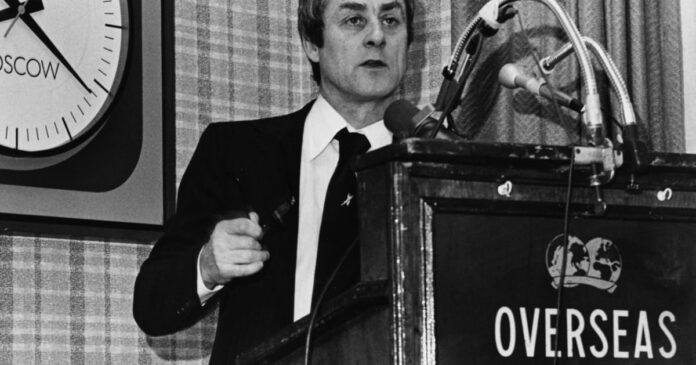Press play to hearken to this text
Voiced by synthetic intelligence.
Tunku Varadarajan is a fellow on the New York College Legislation College’s Classical Liberal Institute. He was a pacesetter author on the London Instances from 1993-96, and its New York bureau chief from 1997-99.
On my first day on the job as a hack on the London Instances 27 years in the past, a grand previous columnist who sat in his personal cubicle close by — a uncommon factor in these days on Fleet Avenue — shuffled over to my desk and gave me a present.
It was a ebook: “Important English for Journalists, Editors and Writers,” by Harold Evans, a primary version, printed in 1972. “I’ve learn it,” he mentioned, “however I haven’t paid sufficient consideration to it. You’ll discover it helpful, although.” The columnist, identified for sentences that always ran to 200 phrases, was proper concerning the ebook. I discovered it a priceless primer on the craft of journalism and stored it at my bedside. (Who can neglect this “high quality,” important in an editor, talked about by Evans?: “Bodily health for a attempting, sedentary life which takes its toll of nerves, sight and digestion.”)
Years later, once I learn Evans’ last ebook — referred to as “Do I Make Myself Clear?”, additionally a information to good writing, printed in 2017 — I realized that he had tried, however failed, to get the columnist in query to shorten his sentences. The latter — who was Bernard Levin, for many who haven’t guessed already — had insisted that “his sentences must be printed unchanged or he would write no extra.” Levin was a nationwide treasure. Evans caved — grumpy however pragmatic.
This was Evans’ solely actual failure in a profession in journalism that started in 1952 with a sub-editorship on the Manchester Night Information, and ended final Wednesday, when he died of coronary heart failure at age 92 at his residence in New York.
Few would disagree that he was the best British newspaperman of his era. I add the parochial qualifier — British — by lazy behavior. Why restrict him? I can’t consider an editor within the wider English-speaking world who’s — or was — a match for the person who made the London Sunday Instances (which he edited from 1967 to 1981) the Apollo 11 of newspapers. By which I imply a paper able to the Big Steps of his Sunday Instances.
Harry Evans have to be the one editor who can declare to have sired a rustic. His publication on June 12, 1971 of a two-page unfold titled “Genocide” — an account of the Pakistani military’s butchering of Bengalis in East Pakistan — prompted Indira Gandhi, India’s prime minister, to intervene militarily to rescue the Bengalis. ”Your article within the Sunday Instances made me do this,” she advised Evans. “That’s why I despatched within the military.” This resulted within the creation of Bangladesh, which, I advised him in jest, ought to actually be referred to as “Harrydesh.”
“British” can also be the incorrect phrase to use to Evans — as an unique label — as a result of he grew to become a U.S. citizen in 1993. His naturalization, when it got here, was essentially the most pure factor: he’d migrated along with his spouse (the editor Tina Brown) in 1984, and spent extra years working on this nation than he had in his place of origin — with Random Home (the place he bought “Goals from My Father,” by a sure neighborhood organizer, for $40,000) and Reuters, amongst others. Evans was from the British working class, and though he by no means dwelt on it, he discovered America liberating.
America was free from the type of toffs — males on the incorrect facet of historical past — who held it towards Evans that he didn’t go to Oxford. (Hugh Trevor-Roper — Lord Dacre — argued towards his appointment as editor of the London Instances in 1981, holding that it was past the scope of a person who’d merely gone to Durham College.)
Evans was pleased with his upward mobility. He didn’t simply develop into the editor of the oldest extant newspaper within the English-speaking world. He grew to become — in his personal telling — editor of a paper that his personal grandfather wouldn’t have been capable of learn. He was knighted for providers to journalism in 2004 — by no means unhealthy for a lad from Eccles — however I believe it was that final scrumptious irony that made him most proud.
















